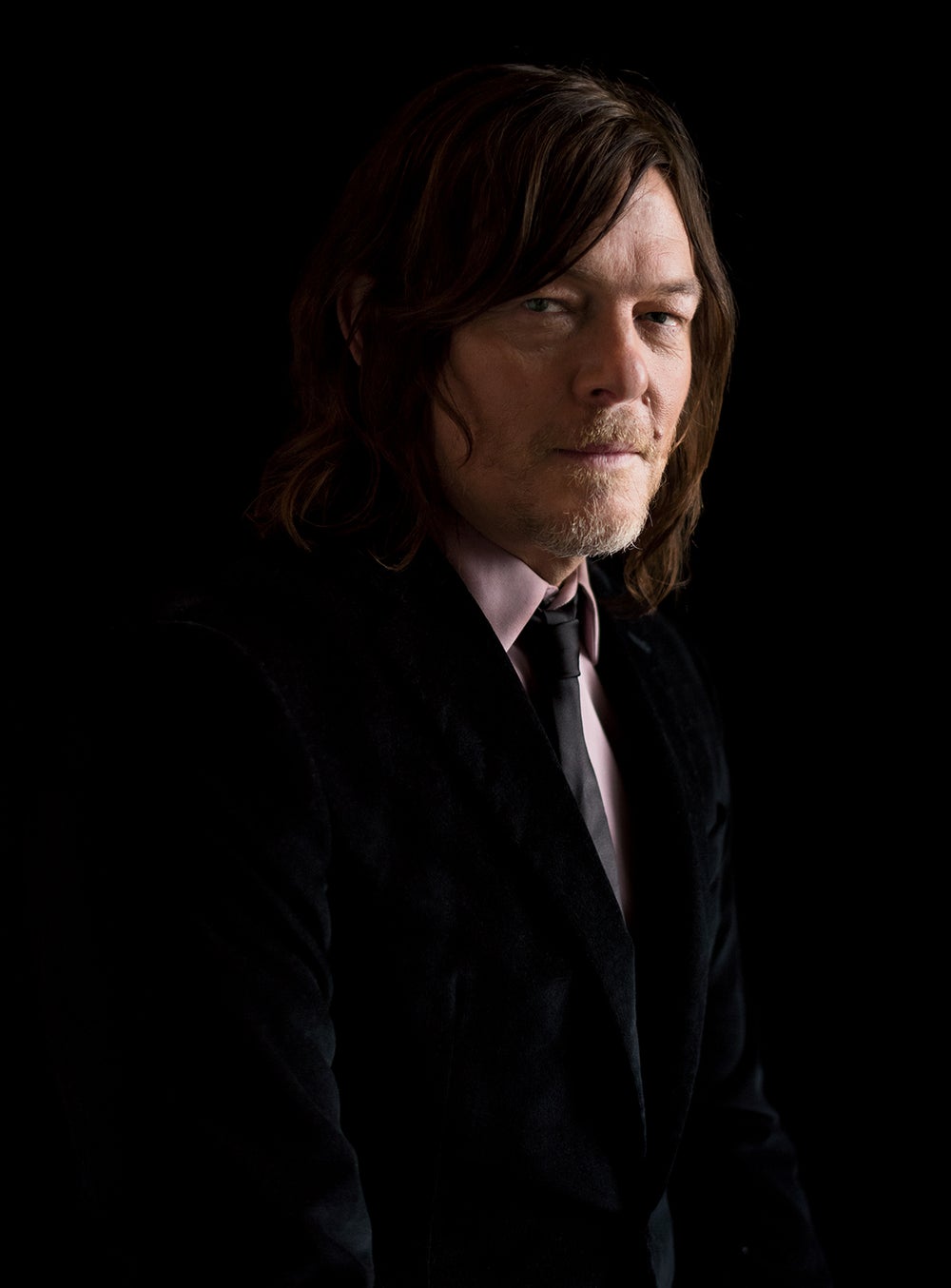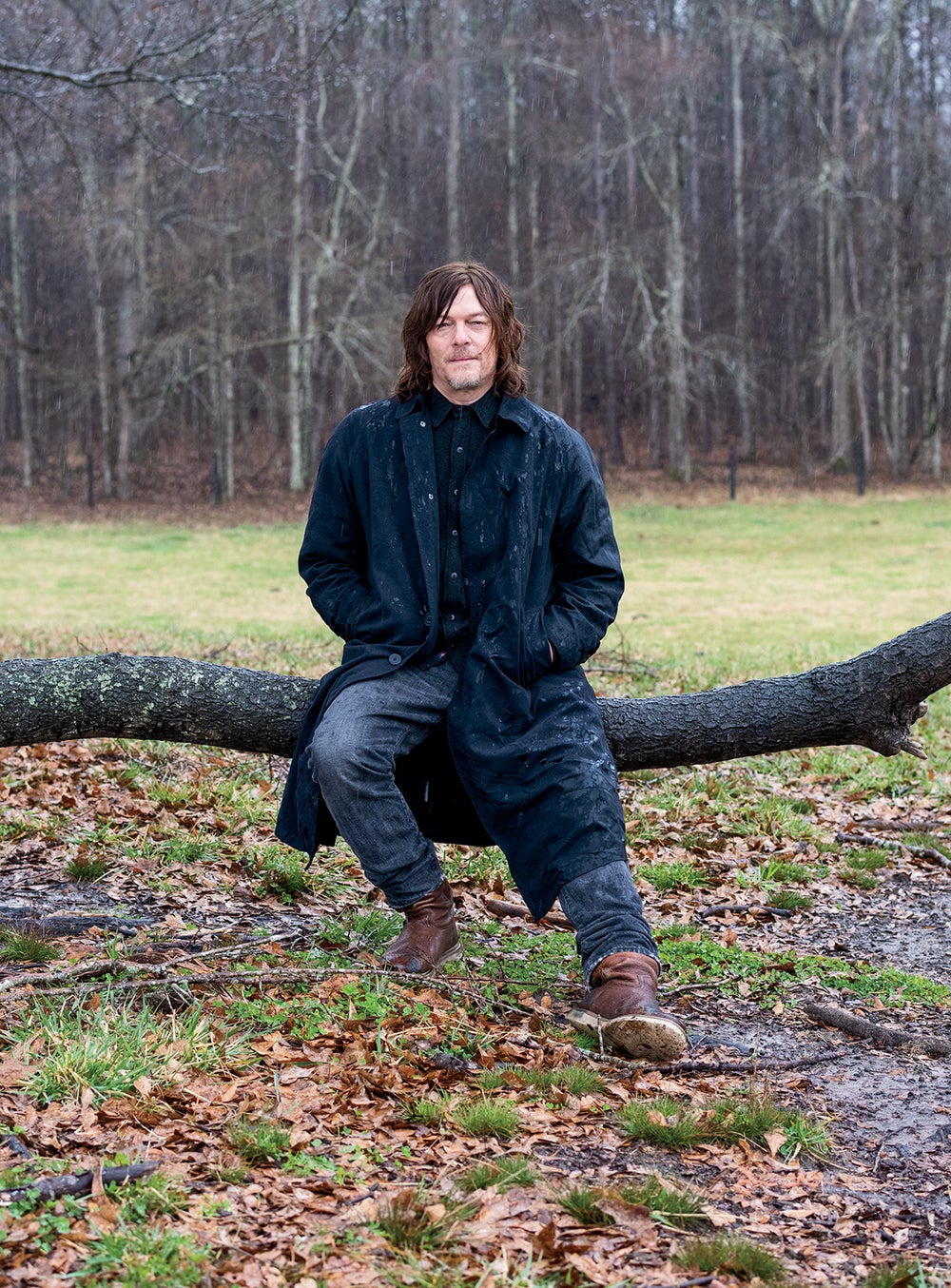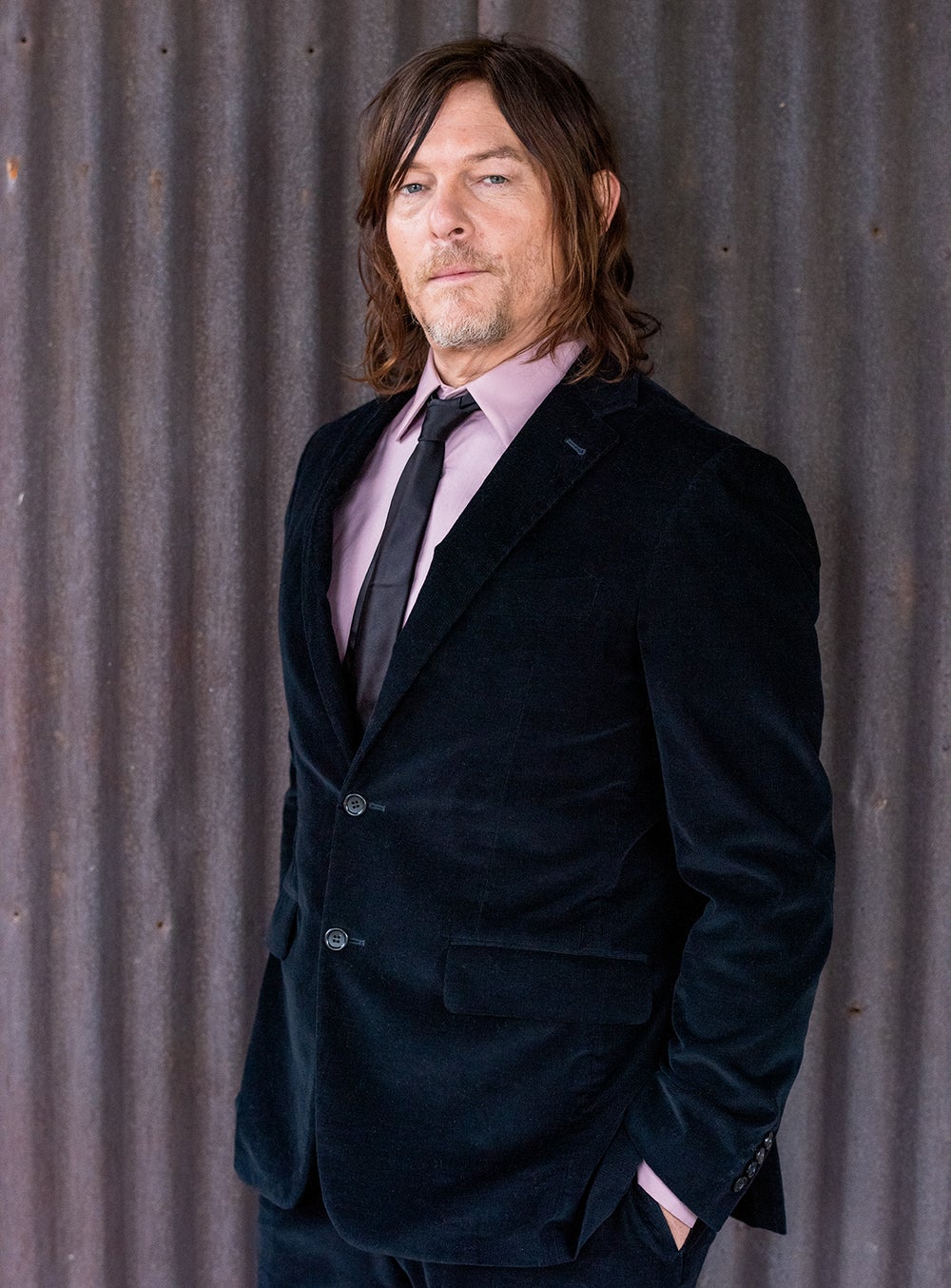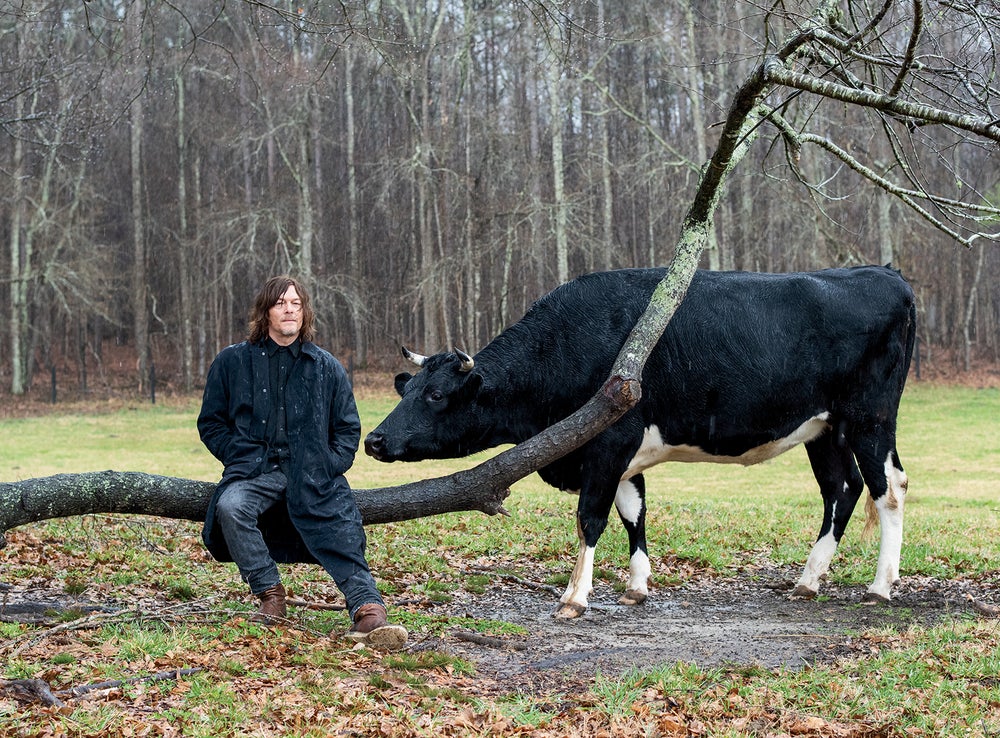Norman Reedus Is Proud to Be the Weirdo-Whisperer: “Flaws Are What Make You Unique”
The ‘Walking Dead’ star (and restaurateur, book publisher, and TV producer) thinks that whatever you’re trying to hide is probably your greatest asset.
This story appears in the April 2022 issue of Entrepreneur. Subscribe »

“You’re going to get a surprise,” classmates kept telling Norman Reedus.
It was his first year of junior high, in Florida, and he was the new kid. He’d bounced around to a lot of schools, and his family didn’t have much money, which made him stick out. Everyone in school wore the same cool pair of Nike high-tops, for example, but Reedus wore a beat-up pair of soccer cleats with a hole in the toe. Now the other kids were talking about a surprise — never a good sign.
At lunch, it happened: The kids gathered around Reedus as he sat at a table. One girl emerged, box in hand, with a bow on top. The kids cooed in unison. Reedus was nervous, but he opened it: Inside was a pair of Nike high-tops, the same as everyone else’s. It was a gift. So he could fit in.
“I was mortified,” he recalls now, at age 53, sitting in a rural Georgia parking lot near where he’s filming the final season of AMC’s The Walking Dead. “I loved my soccer cleats with the hole in the toe. I thought they were awesome. And I never wore the Nikes. I never put them on. I gave them away.”
Related: To Take More Risks, Reframe Your Flaws as the ‘Juicy Stuff’
Reedus pauses. “I don’t know why I just thought of that story,” he says.
But I have a guess.
The kid with the beat-up soccer cleats grew up into an adult who identifies with rough edges. He is fascinated by the grotesque; he photographs roadkill, and once made a statue of himself in a box full of bugs and rats for an art museum. He has a lot of stories about hanging out with delinquents. He’s gotten into a lot of fights. “I don’t like nose jobs; I like people with an interesting nose,” he says.
It’s why Reedus and I have been talking about the power of flaws — and how, counterintuitively, many people’s greatest shames might also be the greatest source of their strength.
Entrepreneurs must confront a version of this constantly. We do it every time we tell our story — to customers, to investors, to partners, to the world — and choose which version to tell. We could tell the polished and untrue story, or the real and difficult one. We could hide our bumps and bruises, or we could make them a part of who we are and what we offer.
Consider this: Every story, whether it’s about your business or a Hollywood movie, tends to be told in a structure called “the hero’s journey.” It’s a simple three-act format: I set out to do something, I experienced a setback, and I overcame. Entrepreneurs are often tempted to skip that second part; when they pitch an investor, or present themselves to customers, they’d rather tell a story in which they set out to do something and then jump straight to the success. It’s understandable: We worry that, if we share our errors and mistakes, we’ll look like untrustworthy fools.
But the opposite is often true. When we skip over our flaws, we become boring and uninspiring. Nobody identifies with perfection; nobody sees themselves in a tale of unbridled achievement. That’s why when we embrace our flaws — and our quirks, our stumbles, our lessons, our hopes — we become relatable. We become someone that others root for, because they see themselves in us.
Everyone, at some point, will have to choose between these two paths: They either ignore their truth and become something they are not, or they lean into what makes them unique, rough edges and all. And that, I told Reedus, is why I think his story from school popped into his mind. It wasn’t exactly a choose-your-destiny moment — even at a young age, he clearly knew who he was, and who he was not. But it could have been. He could have looked at those Nike shoes and decided that being part of the group — denying what made him unique — was a more comfortable path.
Related: Why Self-Awareness Is Key to Innovation
He chose the soccer cleats with a hole in the toe.
“Flaws are what make you unique,” he says, in response to my grand theory. “How do you stay an individual without your flaws? So I’m a fan of flaws. You know, I look a certain way. I talk a certain way. I walk a certain way. I’ve got beady little eyes. I look a little creepy sometimes. I have a million flaws, and I’m not trying to hide them.”
Why hide that stuff? Why not say that stuff? It won’t be for everyone — but it definitely will be for someone. When you put uniqueness into the world, it is like shining a beacon for like-minded souls. They will see it. They will come.
And oh, did they come for Reedus.

When Reedus first arrived on the set of The Walking Dead 11 years ago, he was a largely unknown, then-42-year-old actor hired to play a secondary part. His character, Daryl Dixon, wasn’t even in the original comics the show was based on. And Reedus had no expectations. He’d fallen into acting decades earlier, after encouragement from some guys he drunkenly met at a party, but had mostly done a series of small, gruesome horror flicks. He wasn’t looking for fame. Reedus just wanted a project that would make him happy.
Then the show started airing, and the fan mail arrived. To his surprise, Reedus was becoming the breakout star of what would become the most-watched scripted show on cable television. People sent paintings they’d made of Reedus, and deeply personal mementos, and even, now famously, a breast implant (which he keeps as his phone cradle). “There was so much mail coming to me at the studio that I would come to set and I couldn’t get in my trailer door,” he says. “They were bringing me my mail in a golf-cart type thing, with a trailer pulled behind that was stacked to the rim. And it was literally every day.”
Related: Stop Trying to Pretend That You’re Perfect
At first, Reedus did not know what to do with all this. But here’s what he did know: He was glad it happened to him as a man in his 40s, with real life experience, rather than as a twenty-something full of raw desire. “I don’t know if I would’ve made it,” he says. “I don’t know that I would have become an asshole, but I just don’t know that I would’ve wanted to try very hard.”
Why would success have been a turnoff back then? He says he might have felt a pressure to conform — to hide his flaws and be a more conventional TV star. “I don’t know that I would have tried to hide them,” he says. “I probably would’ve realized people wanted me to hide them to succeed. And I probably would’ve just ran the other direction and done something totally different.”
But by that point, he’d lived long enough to learn one of life’s greatest lessons: When you play a game on your terms, you can change the terms of the game.
So Reedus stayed. His fame grew. When he’d meet fans, they’d often share how, in him, they saw a hidden part of themselves. For example, fans often tell Reedus that his Walking Dead character seems asexual — “and so many people are like, “thank you for that,'” he says. “And I’m like, “Wow, really? That’s great!'”
Reedus keeps many of the things people send him. But he cannot reply to them all. There is literally not enough time in the day, and he doesn’t want to insult people with a stock response. So instead, he says, he’s tried focusing on what matters to them most. Because the thing everyone wants, above all else, is to feel heard. And that means the greatest thing we can do for someone — whether it is Reedus and his fans, or an entrepreneur replying to customers — is to make it clear that they were taken seriously.
Reedus started photographing the artwork people sent him, and then published the photos as a book. “It was basically as a thank-you to those fans — that look, now you’re a published artist!” he says. The book, which is called Thanksforalltheniceness, has sold tens of thousands of copies; all the money it made has gone to charity. He also regularly uses social media to thank or acknowledge groups of people, whether they’re all from the same event or country, and to continue showing them that his — their! — strange sensibilities have a place in the world.
Related: Why a Self-Aware Leader Is a Good Leader
“I didn’t realize I was so good at social media,” he says, “but I’m actually really good at it.” The key, he believes, is simple: Take the relationship with your audience seriously, and never abuse it. When AMC asks him to do takeovers of their own social media accounts, he literally changes the password so nobody from the network can get in. “Then I give them the new password when I’m done,” he says. It’s also why he turns down almost every sponsorship offer he gets, and says no to nearly every request to promote someone’s product. The dollars just aren’t worth the disingenuousness. (But if you’re an entrepreneur trying to score a social post from someone like him, he has advice: Don’t ask for a favor; instead, find a way to create meaningful value for them too. Reedus, for example, loves supporting certain causes, including helping children with severe illnesses, and is far more likely to take notice of a brand that’s similarly minded. “Not only does it look better for everybody, but it feels better for everybody,” he says.)
That mission is also infinitely scalable. Again: Take the relationship with your audience seriously, and never abuse it. The more you deeply consider what people want, the more you can be their hero for providing it. Sometimes all it takes is listening.
Which is how Reedus also became a restaurateur.

“It originally came from me just being in the parking lot of base camp, and hearing everybody laughing and having a good time,” he says.
The Walking Dead is a unique work environment: The cast and crew have been out in the woods together, some for more than a decade, with little to do but enjoy each other’s company. They’d often hang out in the parking lot of the main production area, where the Teamsters would smoke meat. Reedus started to say they should open a dive bar — just a place to relax and tell stories — and everyone was so excited that the idea grew. By 2016, Reedus had partnered with Greg Nicotero, the show’s executive producer and primary director, to create a joint called Nic & Norman’s.
Related: 8 Mandates For Growth
It isn’t a Walking Dead-themed restaurant. It’s just a good American eatery. Burgers, flatbreads, chicken pot pie. It opened in Senoia, Georgia, near where the show is filmed.
Reedus marveled at what happened next. The crew didn’t just hang out there; everyone did. Yes, some of it was show-related: The restaurant would sell out on Sunday nights, as fans packed in to watch the show together. But people also just liked the place. They’d meet friends, build relationships. So Nic & Norman’s expanded: They built one in Chattanooga, and are now planning for more.
I ask Reedus what their goal here is. Why take this idea, meant for one group of people, and give it another life?
“They’re always packed,” he says, which is as good a business answer as any. But then he comes at it philosophically.
“It kind of goes in with the theme of the show,” Reedus says. “Like, these people wouldn’t have made it if they didn’t meet each other and have each other’s backs. Whether you’re running from something or to something, you find family in the most unexpected places. And sometimes, you realize the things you took for granted. You realize lessons that were right in front of you, that you didn’t pay attention to. And by the end of the journey, you’ve changed. Which is kind of my character on the show. It’s kind of my time in Georgia. It’s kind of my time with the success of all this.”
Reedus, clearly, is talking about more than a restaurant here. But isn’t that what a good business should be? More than simply the product or service it provides? Isn’t this what it means to build community, and to collect people along the way?
After all, this is a person comfortable with flaws. Or, no, that’s not really it — Reedus is a person who loves and draws strength from things that some other people might see as flaws. That, in turn, has made him a magnet for others who feel similarly, and has given him an acute appreciation for the things that bring people together. And now he can continue providing that.
Related: I Found Success by Embracing My Greatest Flaw
In addition to his AMC show Ride, where he rides motorcycles around the world with famous friends, Reedus will star in a Walking Dead spinoff — but more than that, he now has a production company, called bigbaldhead, to tell the kinds of stories he believes do not get told enough. He wrote a novel called The Ravaged, which comes out May 10 — but more than that, he started a book imprint with Blackstone Publishing, to publish the work of amazing artists he’s met who have not been given the chance they deserve. And there is more: a forthcoming whiskey, voicing the video game series Death Stranding.
“I’ve found a sense of family in all of those things without knowing I was looking for it, and it’s made me a better person,” he says.
His projects work because, while he didn’t know what he was looking for, other people found what they were missing.

A few years ago, Reedus sat down on a flight from Costa Rica to Uruguay. He was filming a season of Ride and had been running late. “I had a little backpack at my feet that was covered in dust,” he says. “I must have smelled horrible.” And passengers were always recognizing him and asking for photos.
Eventually, the guy sitting next to Reedus piped up. He looked like an older businessman, well dressed with little shorts. “Who are you?” he asked Reedus.
“Oh, I’m on a television show,” Reedus explained.
Then they started to talk. The man told Reedus that he ran one of the largest Fortune 500 companies in the world, and, a few years earlier, his mother had died. On her death bed, she told the man, “You need to run away.”
Related: The 5 Steps to Building Unshakable Confidence
The man didn’t know what that meant. Soon after, the man’s wife died. He took stock of what he had left: He had his company, his employees, lots of property, and a fortune of money. But no children. And nobody to love. He thought again about what his mother said: You have to leave.
Now he understood.
So the man left the company. He drifted around the world. He’d meet someone and they’d say, “You should go to Chile,” and so the man would go to Chile. “And he tells me, he gets to this one intersection out in the middle of nowhere, and he puts his phone up and he’s playing a Prince song, and he’s just dancing,” Reedus says. “He just starts dancing like crazy out where no one can see him. And he’s looking at me with tears in his eyes as he says this. And he’s just bawling. And he goes, “You know, I’ve spent my whole life making money. I’ve wasted my whole life.'”
“That story had such a big impact on me,” Reedus says.
Reedus thinks a lot about things like this — about what it means to live a life that is truly yours. Years ago, Reedus was reading an article about the actor Nicolas Cage, whom he’s a big fan of, and Cage seemed to be grappling with something similar. “He was talking about how his level of success was so big that he felt himself sort of getting soft, and it stuck with me,” Reedus says. “You have to keep your rough edges and not let go, and be conscious of those things. Success can make you un-interesting, but also un-interested.”
Everyone who has tasted success can attest to some version of this. Ambitious people spend most of their lives digging fingernails into mountainsides, crawling and fighting their way upwards. Everyone has their own answer to why they do this, which all in some way boil down to: I want to see what’s possible. It is a perspective oriented around the future, but requires a total faith in yourself in the present. So what happens when…well, you reach where you were headed? And you don’t exactly know what future to strive for next? Maybe you lose a little of what got you there. Maybe you take the cool high-top Nikes out of the box and put them on.
I ask Reedus how he protects his own rough edges despite his success, as his success continues to grow, and what he’s learned for anyone who wrestles with this question the way he does.
Related: How Ryan Reynolds’ Marketing Agency Keeps Making Viral Hits
“I think it’s more about defining what your idea of success is,” he says. “You can die and have a big house and a bunch of cars — but so what? If you can live your life and touch a bunch of people, and maybe change opinions, or maybe have a bunch of friends, and make friends wherever you go, and give off the attitude that you’re open to be friends, and you’re open to meeting up, I think that level of success is much cooler. If that’s the way you’re living, you’re going to make a bigger impact when you go.”
And how do you do that — attract like-minded people, and be a magnet for others? Here’s one answer: Never run from the things that make you stand out. Never stop being a person that others see themselves in. Love your flaws. Don’t even consider them flaws. Keep wearing the soccer cleats with the hole in the toe, a hole so big that people can see you through it.

“You’re going to get a surprise,” classmates kept telling Norman Reedus.
It was his first year of junior high, in Florida, and he was the new kid. He’d bounced around to a lot of schools, and his family didn’t have much money, which made him stick out. Everyone in school wore the same cool pair of Nike high-tops, for example, but Reedus wore a beat-up pair of soccer cleats with a hole in the toe. Now the other kids were talking about a surprise — never a good sign.





